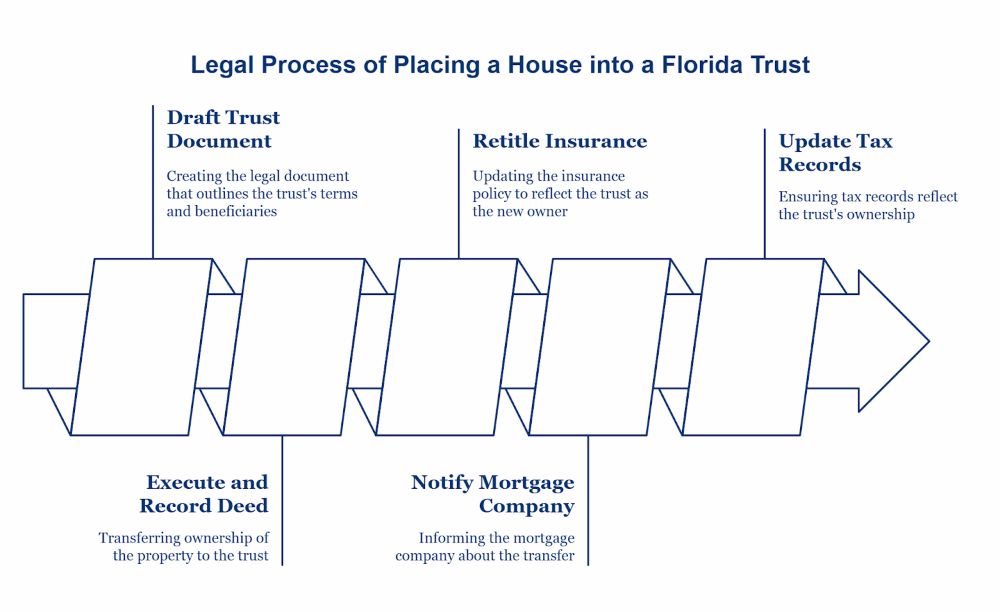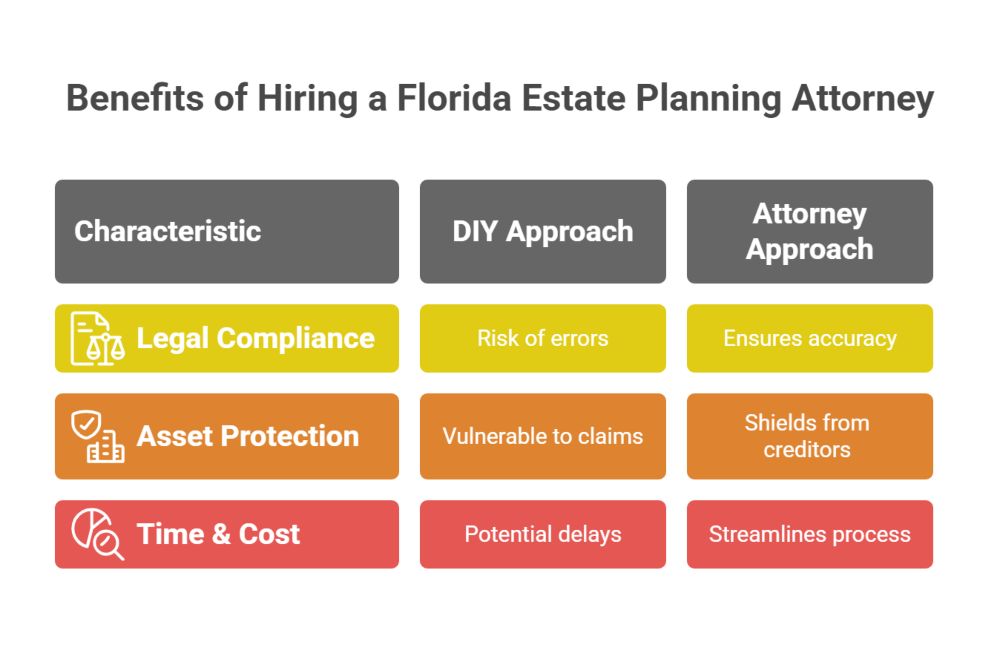

Originally published: June 2025 | Updated: December 2025 | Reviewed by Mary Conte
Owning a house in Florida is a big achievement. Many people want to protect that property for future generations.
Some families view living trusts as a straightforward way to ensure the house passes smoothly to loved ones and avoids the stress of court processes.
You do not need an attorney to put your house in a trust in Florida, but having one can help prevent costly mistakes and make sure everything is done correctly.
Some homeowners feel comfortable filling out paperwork and handling transfers independently.
Others prefer to work with a professional, especially when complicated family situations or special rules are involved.
Understanding when and why legal help matters can save time, stress, and money.

Florida homeowners often place their homes in a trust to streamline the inheritance process, protect their family’s privacy, and help plan for unexpected events. A trust can offer clear benefits that surpass those of a typical will.
One of the main reasons people use a revocable trust for a Florida home is to avoid probate. Probate is a legal process that occurs after someone dies, during which the court verifies the will, pays debts, and distributes assets.
In Florida, this process can be slow and costly. A home placed in a trust does not have to go through the probate process.
This allows loved ones to access the property faster, without waiting for court approval. Trust ownership is especially helpful if family members are living in the home.
They can stay without legal interruptions. For many, this makes a trust better than a will in Florida, at least when it comes to managing the family home.
Below is a brief comparison of probate versus trust ownership:
| Process | Probate | Trust Ownership |
| Time | It can take months or longer | Property can be transferred right away |
| Cost | Court and attorney fees | Fewer expenses after setup |
| Privacy | Public record | Private transaction |
Many people worry about their family’s privacy after they pass away. In Florida, probate is a matter of public record.
This means anyone can see who inherited the house and other details. A trust, in contrast, keeps these matters private.
The information about who gets the home remains within the family and is not made public. This not only protects privacy but also helps prevent conflicts.
Trust documents outline clear instructions. This reduces the chance of misunderstandings or arguments between family members.
When families know what will happen to the house, they are less likely to fight. Privacy and smoother transitions are key advantages that often outweigh the small added costs or paperwork.
A trust is also helpful when someone becomes unable to manage their property. If a homeowner is sick or injured, the chosen trustee can step in and manage the home as needed.
This makes it easier for families to continue caring for their loved ones without needing to go to court for permission.
For those planning for long-term care, placing a house in a trust may help with Medicaid planning in certain situations.
While a revocable trust itself does not fully protect the home from Medicaid claims, it can be part of an overall strategy to keep the property safe for heirs if properly structured with the guidance of legal advice. Using a trust can also help avoid the sale of the house in a hurry during difficult times.
Families can hold onto the home or make important decisions without added stress.
It is legal to place a Florida house in a trust without the assistance of an attorney. However, mistakes during the process can lead to significant legal and financial problems, including loss of homestead protections and tax issues.
A homeowner in Florida can prepare and execute a deed that transfers their house into a trust without hiring a lawyer. This is sometimes referred to as a do-it-yourself, or DIY, trust transfer.
The law does not require the use of an attorney for this process. However, the paperwork involved is detailed.
The deed must be filled out correctly and filed with the county clerk. If the deed or trust document has mistakes, the transfer may be invalid.
Failing to follow Florida statutes on notarization, witnesses, or recording can also cause problems. In some cases, homestead rights may be lost, or the property could be subject to additional taxes.
Some of the most common legal mistakes people make when they try to DIY a Florida house trust without attorney help include:
These errors might cause title problems. Sometimes, banks or title companies may not recognize the trust, which can result in delays or prevent a future sale or refinance.
Incorrect transfers could also affect Medicaid eligibility or property tax exemptions. Fixing these errors later often costs more time and money than working with an attorney in the first place.
In real cases, Florida courts have had to decide whether a trust owned a house. For example, if a trust document was not properly signed or if a deed was never recorded, the court might rule the transfer invalid.
There have been instances where surviving family members were unable to sell or inherit the home due to a simple paperwork error. Sometimes, the house ends up stuck in probate court, even though the original goal was to avoid it.
These problems can be stressful and expensive. Because a court follows strict rules, even a minor error in the transfer of the house to the trust can create conflict among heirs or lead to lengthy delays.
Worried your Florida home could get stuck in probate? Conte Mollenhauer Law helps you transfer real estate into a living trust—correctly and without court delays. Schedule your estate planning call today.
If you’re ready to get started, call us now!

In Florida, placing a house into a trust helps keep the property out of probate and can provide long-term control. The process involves completing legal paperwork, updating the title, and ensuring that all related records are in alignment.
The first step in placing a house in a trust in Florida is to create the trust document.
This legal document lists the individuals involved, including the grantor (the person creating the trust), the trustee, and the beneficiaries.
The trust outlines who will be responsible for the house and who will inherit the house in the event of the owner’s passing.
The trust document must list all property to be placed in the trust, including specific details about the home, such as the address and legal description. In Florida, it is common to use a revocable living trust for real estate.
Many people choose to work with an attorney to ensure the trust is valid and meets their needs.
Once the trust document is done, the owner must transfer the real estate to the trust using a new deed.
The most common form is a warranty deed or a quitclaim deed. This deed moves ownership from the individual to the trust.
The deed should include the full legal description of the property and name the trust as the new owner. After the deed is signed and notarized, it needs to be recorded with the county clerk’s office where the property is located.
Recording is important because it makes the transfer public and official. Recording fees and documentary stamp taxes may apply during this step.
These fees are usually paid at the time of recording.
After a Florida deed transfer to trust is recorded, additional changes may be required. The homeowner’s insurance policy should be updated to reflect the trust as the new owner.
This protects the property in case of damage or loss. The mortgage company also needs to know about the real estate trust transfer.
Some mortgage agreements may require permission from the lender before transfer. Tax records and any homestead exemption paperwork should be updated to show that the trust owns the Florida real estate in a living trust.
This helps ensure no benefits are lost and taxes are paid correctly. Taking these steps helps make sure the house is fully protected and legal under the trust.

A Florida estate planning attorney helps families avoid common mistakes when putting real estate into a trust. Legal advice can make the process faster, safer, and easier for everyone involved.
Florida trust law has complex rules governing the transfer of property into a trust. An attorney for a living trust in Florida is familiar with the specific steps required to ensure a trust is valid.
For example, Florida law requires a properly signed and notarized deed when moving a house into a trust. Mistakes in legal paperwork can lead to a trust’s failure.
Homeowners may risk losing essential protections if key regulations are not followed. A Florida estate planning lawyer and real estate specialist review each document for accuracy, ensuring all requirements are met.
When a house is placed in a trust correctly, it may be protected from certain creditor claims. Professional legal guidance is important because a mistake in the process could leave property exposed.
A Florida trust attorney in Lake Mary or any other city helps individuals understand when asset protection is applicable. A trust can also let families avoid probate court after someone passes away.
If the title of the house is not properly transferred, the property may still be subject to probate. This could slow down the inheritance process and create legal complications.
Benefits of a legally sound trust:
Do you need a lawyer to put your house in a trust in Florida? While it is possible to try alone, mistakes can result in lost time and higher costs later.
Fixing problems with a trust is often much harder than doing it right the first time. A Florida estate planning lawyer makes the process straightforward.
They explain each step, help prepare paperwork, and file documents on time. This saves families emotional stress, prevents costly court issues, and speeds up property transfers in the future.
A single missed detail on your deed can unravel your whole plan. Conte Mollenhauer Law handles Florida trust-based home transfers with total legal precision. Contact us now to safeguard your property rights.
If you’re ready to get started, call us now!
Some people can put their house into a trust on their own. Others face challenges that often require help from an estate planning attorney in Florida.
These challenges often involve unique legal, financial, or family details that are difficult to resolve without professional legal advice.
Blended families, which include children from more than one marriage, often require specialized trust planning. Lawyers help ensure that each person’s wishes are clear and that every family member receives their rightful share.
Without legal guidance, someone might be left out or become involved in a costly dispute. When families are large or have strained relationships, arguments can arise over who owns or controls the property.
An attorney can draft the trust to avoid confusion and protect the interests of all parties involved. Stepchildren, adopted children, and new spouses can all add extra legal steps that a professional should handle.
In cases involving divorce, estranged relatives, or unequal distribution wishes, the legal paperwork must be exact. An estate planning attorney in Florida reviews each detail to help prevent problems that could be costly or emotionally distressing in the future.
If a home has a mortgage, the property title cannot be moved to a trust without following the bank’s rules. An attorney checks with lenders to avoid triggering a “due-on-sale” clause, which might force the homeowner to pay off the loan early.
This protects the owner from unexpected expenses and additional costs. Some homes have liens or outstanding debts associated with the property.
A lawyer will address these before the transfer so that the trust is set up correctly. Homeowners’ Associations (HOAs) sometimes have rules that affect transferring property into a trust.
A lawyer reviews the HOA documents to help owners stay in compliance and avoid fines.
Key Steps a Lawyer Can Take:
When someone plans for possible long-term care or Medicaid, placing a house in a trust can impact their eligibility. There are strict Medicaid rules in Florida regarding the transfer of assets.
Moving a home at the wrong time or in the wrong manner can result in a delay or denial of benefits. Elder law attorneys understand these details and create trust documents that protect the home while following Medicaid guidelines.
An attorney can explain strategies, such as irrevocable trusts, that help shield assets from nursing home costs without breaking the law. Mistakes in this area often cannot be undone and might put a home at risk.
Working with a lawyer ensures the trust does not hurt Medicaid eligibility and protects the owner’s future care needs.
Florida law has unique rules governing the transfer of a home into a trust. Certain steps must be taken to avoid losing benefits or incurring additional costs.
Florida’s homestead exemption can lower property taxes and protect a home from some creditors. When a home goes into a trust, owners must be careful not to lose this exemption.
To retain the homestead exemption, the trust must clearly state that the owner has the right to reside in the home. The owner must also live in the house as their main residence.
If these steps are skipped, the property may lose tax savings and other legal protections. A trust can help a family avoid probate court, but it does not always protect against all creditors.
It is essential to carefully review and adhere to all Florida homestead rules. An error can be costly and lead to additional legal steps later.
A Lady Bird Deed, also known as an enhanced life estate deed, allows the owner to retain full control over the home during their lifetime. After death, the house passes straight to someone else without probate.
This is different from a trust, which can include more detailed instructions for property and other assets. Both options avoid probate, but a trust is often better for handling complicated family issues or multiple properties.
In Florida, Lady Bird Deeds are popular because they are simple and, unlike a trust, do not require changing how the home is owned during life. People should compare a trust vs a Lady Bird Deed in Florida before making a decision.
Each solution has benefits and drawbacks depending on taxes, family needs, and long-term plans. It can be helpful to speak with a professional who understands both tools.
Transferring a home into a trust in Florida requires careful attention to legal details and the completion of necessary documents. Missing a step can cause delays or extra costs during probate or if the deed isn’t properly recorded.
1. Verify the Deed:
Homeowners should make sure their deed matches the legal name of the trust. The attorney will review whether a quitclaim or warranty deed is the best option.
2. Confirm Property Insurance:
Check with the insurance company to update the property owner’s name to the trust. This helps prevent claim issues later.
3. Estimate All Costs:
Typical costs include attorney’s fees (which can range from $500 to $2,500). Recording fees are approximately $10 per page, and additional title insurance fees may apply.
4. Address Mortgages and Liens:
If the home has a mortgage, the lender’s approval or review may be needed. This should be completed before transferring the property to the trust.
5. Update Homestead Exemption:
Florida’s homestead exemption may need to be updated. This ensures homeowners remain eligible for tax benefits after the transfer.
Don’t leave your family guessing—or battling probate courts. Conte Mollenhauer Law creates legally sound trusts that protect your home, your wishes, and your peace of mind. Book your Florida trust consult now.
Do you need a lawyer to put your house in a trust in Florida?
No, Florida law does not require you to hire a lawyer to transfer your house into a trust. However, working with an estate planning attorney is highly recommended to avoid errors with the deed, title, or trust structure that could invalidate your plan or expose the property to probate.
What happens if you put your home in a trust without an attorney?
Mistakes in legal documents or deed recording can lead to probate, tax issues, or the loss of homestead exemption. An attorney ensures proper titling, trust language, and legal compliance specific to Florida real estate law.
Can you use a quitclaim deed to transfer your house to a trust in Florida?
Yes, a quitclaim deed is commonly used to transfer a home into a trust in Florida. However, depending on your situation, a warranty deed or a bird deed may be more appropriate. Legal advice can help you choose the right type of insurance.
Will transferring your home into a trust affect your property taxes in Florida?
Not if the trust is properly drafted to retain your homestead exemption. A revocable trust must name the homeowner as both trustee and beneficiary during their lifetime to preserve property tax benefits under Florida law.
Is a Lady Bird deed better than a trust in Florida?
A Lady Bird deed is simpler and avoids probate, but offers less control and flexibility than a trust. Trusts enable detailed asset distribution, incapacity planning, and privacy, making them ideal for more comprehensive estate plans.
Can you put a mortgaged home into a trust in Florida?
Yes, most lenders allow you to transfer a mortgaged property into a revocable trust. However, you should review your loan terms and notify the lender to avoid triggering the due-on-sale clause.
How much does it cost to put your house into a trust in Florida?
The cost typically ranges from $1,200 to $2,500 when done through an attorney. This includes the trust draft, deed preparation, notary services, and title updates. DIY services are cheaper but carry legal risks.